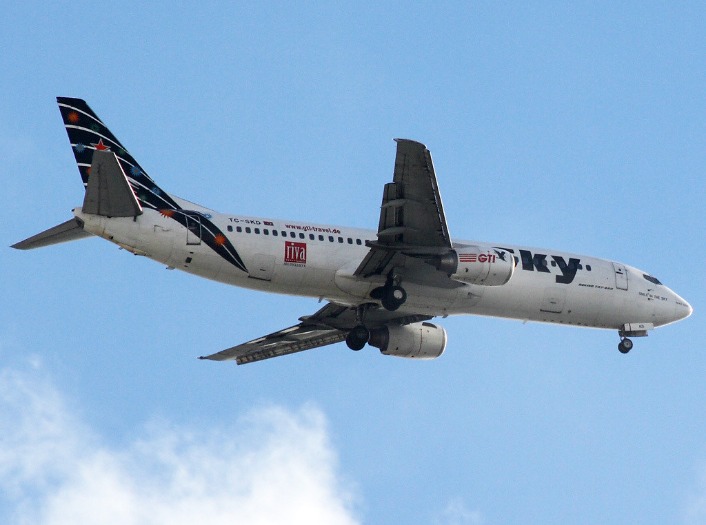Overview of Algeria’s Airline Industry
Algeria’s airline industry plays a vital role in connecting the North African country with regional and international destinations. It has experienced steady growth due to increasing domestic and international travel demands, supported by a combination of state-owned carriers and private airlines. The industry continues to evolve, aiming to enhance flight services, expand route networks, and improve airport infrastructure to meet the needs of travelers in and beyond Algeria.
Historical Development
The airline industry in Algeria has experienced significant growth and development over the years, serving as a vital component of the country’s transportation infrastructure. Historically, the industry began with the establishment of state-owned carriers that focused on domestic and limited international routes, aiming to connect Algeria internally and with the broader world. During the colonial period, air services were primarily operated by foreign airlines, but post-independence, Algeria launched its own national airline to foster national connectivity and economic development.
In the decades following independence, the industry saw substantial expansion with the establishment of Air Algérie, the country’s flagship carrier, which became a symbol of national pride and a key player in the regional aviation sector. The Algerian government invested heavily in modernizing its fleet and expanding its route network, including both domestic destinations and international destinations across Africa, Europe, the Middle East, and beyond. The industry also faced challenges such as economic fluctuations, political influences, and global events impacting travel demand.
In recent years, Algeria’s airline industry has continued to evolve with efforts to modernize infrastructure, improve service quality, and adopt new technologies. The development of new airports and the upgrading of existing facilities aim to boost tourism and trade. Meanwhile, regional and international partnerships, along with the growth of low-cost carriers, have played a role in expanding options for travelers and increasing competitiveness. Overall, the Algerian airline industry remains a crucial sector contributing to the country’s economic growth and regional connectivity.
Current Market Landscape
The airline industry in Algeria has experienced significant growth over recent years, driven by an expanding domestic market and increasing international connectivity. Algeria’s national carrier, Air Algérie, plays a central role in serving both domestic routes and international destinations across Africa, Europe, and the Middle East. The industry faces challenges such as aging infrastructure, regulatory reforms, and infrastructural investments aimed at modernizing airports and expanding airline fleet capabilities. Additionally, the rise of private carriers and regional low-cost airlines has contributed to a more competitive and dynamic market landscape. The government’s initiatives to boost tourism and foster economic diversification are expected to further stimulate growth within Algeria’s airline sector in the coming years.
Key Airlines Operating in Algeria
The airline industry in Algeria is a vital segment of the country’s transportation infrastructure, supporting both domestic connectivity and international travel. It has experienced growth over the years, driven by increased demand for passenger and cargo services, as well as efforts to modernize and expand airport facilities across the nation.
Several key airlines operate within Algeria, serving both regional and long-haul destinations. These airlines play a crucial role in facilitating economic development, tourism, and business travel throughout North Africa and beyond.
- Air Algerie: The national flag carrier and largest airline in Algeria, offering extensive domestic flights and international services across Africa, Europe, the Middle East, and Asia.
- Aigle Azur: A regional carrier that has historically operated flights connecting Algeria to France and other European destinations.
- Tassili Airlines: A domestically focused airline primarily serving internal routes within Algeria and regional destinations in neighboring countries.
Major Airlines in Algeria
Major airlines in Algeria play a vital role in connecting the country with destinations around the world. These airlines offer a range of domestic and international flights, facilitating travel, tourism, and commerce. Known for their commitment to safety and service quality, Algerian airlines have established a significant presence in both regional and global aviation networks.
Air Algérie
Air Algérie is the national airline of Algeria, serving as the primary carrier for both domestic and international flights. It was established in 1947 and has since grown to become a key player in North African aviation. The airline is known for connecting major cities within Algeria as well as providing flights to Europe, Africa, the Middle East, and North America.
- Headquartered in Algiers, Air Algérie operates a fleet of modern aircraft including Airbus Airbus A330, Boeing 737, and ATR series.
- The airline offers various classes of service, including economy and business class, catering to different passenger needs.
- Air Algérie is a member of the International Air Transport Association (IATA), ensuring adherence to global aviation standards.
- Its route network includes key destinations such as Paris, Montreal, Dubai, and various African capitals.
- The airline emphasizes safety, customer service, and expanding its route offerings to enhance connectivity for Algerian travelers.
Other Domestic Carriers
Major airlines in Algeria include Air Algerie, the country’s primary international and domestic carrier, which connects Algeria to numerous destinations worldwide. Air Algerie is renowned for its extensive network within Africa, Europe, and the Middle East, serving both commercial and cargo flights. Besides Air Algerie, there are other domestic carriers and regional operators that facilitate travel within Algeria, such as ASL Airlines Algeria and Air Express Algeria. These airlines primarily focus on domestic routes and regional services, providing critical connections for travelers across the country and neighboring regions. The airline industry in Algeria is vital for economic development, tourism, and facilitating business activities in the region.
International Airlines Serving Algeria
Algeria’s aviation industry is served by several major airlines within the country and various international airlines that operate flights to and from Algeria. The national carrier, Air Algérie, is the primary airline providing domestic and international routes, connecting major cities across Europe, Africa, the Middle East, and North America. Other notable Algerian airlines include Air Algerie Express, a regional carrier focusing on domestic and nearby international destinations. International airlines serving Algeria encompass well-known carriers such as Air France, which offers extensive European connections, Turkish Airlines, providing routes through Istanbul to numerous global destinations, and Royal Air Maroc connecting Algeria to Morocco and beyond. Additionally, airlines like Lufthansa, Air Italy, and Alitalia also operate flights to Algerian airports, facilitating travel across Europe and facilitating business and tourism.”
Airline Fleet and Operations
Algeria’s airline industry plays a vital role in connecting the country both domestically and internationally. The airline fleet and operations are essential for facilitating travel, trade, and tourism across Africa, Europe, and beyond. With a focus on modernizing its fleet and expanding routes, Algeria aims to enhance its competitiveness in the global aviation market while ensuring efficient and safe air travel for passengers.
Fleet Composition and Modernization
Algeria’s airline industry has been focused on maintaining a versatile and modern fleet to support its domestic and international routes. The airline’s fleet composition includes a mix of narrow-body and wide-body aircraft, primarily composed of Western-built jets such as Airbus and Boeing, which are well-suited to handle the varying demands of regional and long-haul flights. Ongoing modernization efforts aim to enhance operational efficiency, passenger comfort, and safety standards by gradually replacing older aircraft with newer, more fuel-efficient models.
Algerian Airlines has prioritized fleet expansion and renewal in recent years to improve route coverage and competitiveness. Investments in modern aircraft like the Airbus A320 family for short to medium routes and wide-body planes such as the Airbus A330 or Boeing 787 for long-distance flights have allowed better connectivity and reduced operating costs. These modernization initiatives also include upgrading cabin configurations and avionic systems to meet international safety and service standards, ensuring the airline remains a key player in North Africa’s aviation sector.
Aircraft Maintenance and Safety Protocols
Algeria’s airline industry relies on a modern and diverse fleet to ensure efficient and reliable transportation across domestic and international routes. The fleet includes a mix of wide-body and narrow-body aircraft from leading manufacturers, optimized for passenger comfort and operational efficiency. Rigorous maintenance schedules and safety protocols are integral to the airline’s operations, adhering to international standards set by aviation authorities such as ICAO and IATA. Aircraft maintenance is conducted through regular inspections, repairs, and overhauls to ensure airworthiness and safety. Safety protocols encompass comprehensive training for crew members, strict adherence to operational procedures, and the implementation of advanced safety management systems. These measures collectively uphold high safety standards, foster passenger confidence, and support the airline’s commitment to secure and smooth operations across all routes.
Routes and Network Coverage
Algeria’s airline industry features a diverse fleet that supports extensive domestic and international operations. The national carrier, Air Algerie, operates a mix of wide-body and narrow-body aircraft, including models from Airbus, to facilitate long-haul flights and regional routes. The fleet is regularly updated to maintain compliance with safety standards and enhance operational efficiency.
In terms of routes and network coverage, Algeria’s airline network primarily focuses on connecting major cities within the country, such as Algiers, Oran, and Constantine, to key international destinations across Europe, Africa, the Middle East, and beyond. The airline serves numerous regional hubs, facilitating convenient transfer options and expanding its global reach. Strategic route planning aims to boost tourism, trade, and diplomatic ties, ensuring comprehensive coverage that supports Algeria’s economic development and connectivity needs.
Airport Infrastructure Supporting Airlines
Airport infrastructure plays a crucial role in supporting airline operations and ensuring smooth air travel experiences. In Algeria, the development and maintenance of modern airports are essential to facilitate domestic and international flights, boost tourism, and promote economic growth. A well-established infrastructure includes runways, terminals, air traffic control systems, and passenger services, all of which are vital for the success of Algerian airlines and their connectivity worldwide.
Main Hubs and Terminals
Airport infrastructure plays a vital role in supporting airlines, especially in countries like Algeria where robust transportation networks are essential for economic growth and connectivity. Main hubs and terminals are the backbone of this infrastructure, facilitating smooth passenger movement, cargo logistics, and airline operations. In Algeria, key airports such as Houari Boumediene Airport in Algiers serve as major hubs, equipped with modern terminals designed to handle high passenger volumes efficiently. These hubs feature advanced security systems, numerous check-in counters, diverse retail outlets, and efficient baggage handling facilities to enhance traveler experience. Additionally, Algeria’s airports are continuously expanding and upgrading their infrastructure to accommodate increasing air traffic and to foster greater international and domestic connectivity, supporting both national airlines and regional carriers. The development of such airport facilities is essential for strengthening Algeria’s airline industry and ensuring its competitiveness in the global aviation market.
Airport Expansion Projects
Airport infrastructure plays a vital role in supporting airlines by providing essential facilities for passenger processing, cargo handling, aircraft parking, and baggage management. For Algeria, a growing aviation market, ongoing airport expansion projects are crucial to accommodate increasing passenger traffic and improve overall operational efficiency. These developments often include expanding runways, modernizing terminal buildings, enhancing safety and security systems, and upgrading air traffic control services. Such investments not only facilitate smoother airline operations but also boost tourism and economic growth by attracting more travelers. Algeria’s focus on expanding its airport infrastructure demonstrates its commitment to becoming a key hub in the region and supporting its national airline’s ambitions for increased connectivity and service excellence.
Connectivity and Ground Services
Airport infrastructure is a critical component in supporting airlines, enhancing connectivity, and providing reliable ground services for passengers and cargo. In Algeria, the development of modern airport facilities plays a vital role in boosting the country’s aviation sector and facilitating international and domestic travel. Well-equipped terminals, advanced baggage handling systems, and spacious runways are essential for accommodating a growing fleet of airlines operating within and through Algerian airports.
Connectivity is greatly improved through strategic airport locations and efficient transportation links, enabling seamless movement of travelers and goods. Algerian airports, such as Houari Boumediene Airport in Algiers and Oran Es Sénia Airport, are continuously upgrading their infrastructure to offer better commercial services, faster check-in procedures, and easy access to ground transportation including taxis, buses, and car rentals.
Ground services further enhance airline operations by providing efficient aircraft servicing, passenger assistance, security, and customs clearance. Investment in ground support equipment and skilled personnel ensures smooth aircraft turnaround times, punctual departures, and high levels of safety. Overall, robust airport infrastructure is essential for supporting the growth of Algerian airlines and improving overall connectivity within the region and beyond.
Travel Regulations and Policies
Travel regulations and policies play a crucial role in ensuring smooth and safe passenger experiences when flying with airlines like Algeria Airline. Understanding these rules helps travelers prepare for security procedures, baggage allowances, and entry requirements, fostering a hassle-free journey. By staying informed about current regulations, passengers can avoid potential issues and enjoy their travels with confidence.
Visa and Entry Requirements
Travel regulations and policies for Algeria Airlines travelers are essential to ensure a smooth journey. Understanding visa and entry requirements is crucial before planning your trip to or from Algeria.
- Passengers must have a valid passport with at least six months of validity beyond the intended stay.
- Visa requirements vary depending on the traveler’s nationality. Citizens of some countries can enter Algeria visa-free for a limited period, while others must obtain a visa beforehand.
- Visas can be requested at Algerian consulates or embassies, and applicants may need to provide proof of accommodation, sufficient funds, and return tickets.
- Travelers arriving for tourism, business, or family visits should check specific visa conditions and required documentation well in advance.
- Upon entry, travelers might be subject to health screening and customs inspections, with restrictions on certain goods and medications.
- It is advisable to stay updated with official Algerian government sources or Algerian Airlines for any recent adjustments to travel policies, especially in light of changing global health guidelines.
Security Protocols and Passenger Safety
Algeria Airlines adheres to strict travel regulations and policies to ensure a smooth and lawful journey for all passengers. Travelers are required to present valid identification and necessary travel documents, including visas where applicable, in accordance with international and national aviation authorities. Security protocols are rigorously implemented at all airports, involving thorough baggage checks, passenger screenings, and adherence to customs procedures to prevent any security threats. Passenger safety is prioritized through comprehensive safety training for crew members, regular maintenance of aircraft, and implementation of emergency protocols. These measures collectively aim to provide a secure, comfortable, and reliable travel experience for travelers flying with Algeria Airlines.
Covid-19 Impact and Recovery Measures
Algeria Airlines has implemented a series of travel regulations and policies to ensure passenger safety and comply with international standards amid the ongoing COVID-19 pandemic. These measures include mandatory health screenings, the requirement for travelers to present negative COVID-19 test results prior to departure and upon arrival, and the enforcement of mask-wearing and social distancing protocols onboard flights and in airports. The airline continuously updates its policies in accordance with directives from health authorities and government regulations to adapt to the changing pandemic situation.
The impact of COVID-19 on Algeria Airlines has been significant, leading to reduced flight schedules, decreased passenger volumes, and financial challenges. The airline faced cancellations of many domestic and international routes, which affected connectivity and revenue. In response, Algeria Airlines has adopted flexible ticketing options, introduced enhanced health and safety measures, and increased communication to reassure travelers of their safety during travel.
Recovery measures undertaken by Algeria Airlines focus on restoring confidence and rebuilding its network. These include implementing rigorous sanitation procedures, promoting health and safety messaging, and collaborating with airports and health agencies to streamline procedures. The airline is also exploring new routes and increasing frequencies on popular destinations to stimulate demand. Additionally, Algeria Airlines has prioritized staff training on new health protocols and technological upgrades to facilitate contactless services, aiming to accelerate its recovery and ensure a safe travel experience for all passengers.
Market Challenges and Opportunities
The airline industry in Algeria faces a unique landscape of challenges and opportunities shaped by economic, political, and infrastructural factors. Amid fluctuating fuel prices and regulatory requirements, Algerian airlines must adapt to ensure competitiveness while exploring new markets and technological advancements. Despite obstacles, the sector also presents promising prospects for growth through increased tourism, regional connectivity, and modernization efforts that can enhance passenger experience and operational efficiency.
Economic Factors Influencing Airlines
The airline industry in Algeria faces a complex landscape of challenges and opportunities shaped by various economic factors. While economic growth can stimulate demand for domestic and international travel, it also impacts operational costs and fare structures. Fluctuations in oil prices, currency stability, and government policies significantly influence airline profitability and expansion plans in the country.
- Growing regional tourism presents opportunities for Algerian airlines to expand routes and increase passenger numbers.
- Investment in infrastructure development can enhance operational efficiency and customer experience, opening avenues for competitiveness.
- Economic instability and inflation can increase maintenance and fuel costs, posing challenges to financial sustainability.
- Limited access to financing and high operational costs hinder fleet expansion and modernization efforts.
- Government policies, such as subsidies or restrictions, affect market growth and foreign partnerships.
- Global economic downturns, like those caused by pandemics, can sharply reduce passenger demand and cargo revenue.
Competition and Market Share
The Algerian airline industry faces a dynamic landscape characterized by significant challenges and notable opportunities. Market challenges include competition from international carriers, fluctuating fuel prices, regulatory hurdles, and infrastructural limitations that can impact service quality and cost efficiency. Additionally, regional security concerns can influence passenger confidence and international partnerships. However, these obstacles also present opportunities for growth through modernization of fleet, enhancement of network routes, and strategic alliances within Africa and beyond. Expanding tourism and business travel sectors offer promising avenues for increased demand and revenue streams.
In terms of competition, Algeria’s airline sector is contested by both domestic carriers like Air Algérie and various foreign airlines operating in the region. Domestic airlines dominate the local market but face pressures from international competitors on key routes, especially to Europe, Africa, and the Middle East. Market share is often influenced by factors such as pricing strategies, network coverage, and customer service quality. Strengthening market share requires airlines to innovate, improve operational efficiency, and focus on customer experience to build brand loyalty in a competitive environment. Overall, navigating these market dynamics is essential for Algerian airlines to sustain growth and enhance their global presence.
Future Growth Prospects
The Algerian airline industry faces a dynamic landscape marked by both significant challenges and promising opportunities. Political and economic factors, such as recent regulatory changes and fluctuating oil prices, impact operational stability and profitability. Infrastructure limitations and geographic vastness pose logistical hurdles, but they also present opportunities for expansion and modernization. Increasing demand for domestic and international travel driven by economic recovery and tourism growth offers potential for strategic growth and market penetration.
Future growth prospects for Algerian airlines are optimistic, especially with investments in fleet renewal, airport development, and technological advancements. The government’s focus on enhancing transportation infrastructure and fostering regional connectivity can accelerate industry growth. Additionally, the rise of e-commerce and international business travel opens avenues for expanding service offerings. Despite challenges, the sector’s resilience and strategic initiatives could position Algerian airlines as a vital player in the North African and Mediterranean aviation markets.
Customer Experience and Services
Customer experience and services play a vital role in shaping the reputation and success of airlines, including those operating in Algeria. Providing seamless, efficient, and personalized service helps airlines build loyalty and trust among passengers. In the competitive aviation industry, prioritizing customer satisfaction through quality services and positive interactions is essential for airlines to stand out and meet travelers’ expectations.
In-flight Amenities
Algeria Airlines prioritizes enhancing customer experience and in-flight amenities to provide a comfortable and enjoyable journey for passengers. The airline aims to elevate its service standards through a variety of in-flight offerings designed to meet the needs of diverse travelers.
- Comfortable seating with adjustable headrests and ample legroom in all classes
- In-flight entertainment systems featuring a selection of movies, TV shows, and music
- Gourmet meal options including regional Algerian cuisine and special dietary accommodations
- Complimentary beverages ranging from soft drinks to premium alcoholic drinks
- Outlet charging ports and Wi-Fi connectivity on select aircraft for staying connected
- Duty-free shopping options available during long-haul flights
- Friendly cabin crew providing attentive service and assistance throughout the flight
Algeria Airlines continuously seeks to improve its in-flight amenities by incorporating modern technology and personalized services, ensuring that every passenger has a pleasant and memorable travel experience.
Customer Support and Loyalty Programs
Algeria Airlines focuses heavily on enhancing Customer Experience and Services to meet the evolving needs of its passengers. The airline strives to provide comfortable seating, quality in-flight catering, and efficient check-in processes to ensure a seamless travel experience. Excellent Customer Support is vital, with dedicated staff available at airports and through digital channels to assist with bookings, inquiries, and special requests, fostering trust and satisfaction among travelers. Additionally, Algeria Airlines implements Loyalty Programs designed to reward frequent flyers, offering benefits such as priority boarding, extra baggage allowance, and exclusive discounts. These initiatives aim to build long-term customer relationships, encouraging brand loyalty and repeat business while positioning the airline as a reliable and customer-centric carrier in the region.

Business Class and Premium Services
Algeria Airlines is committed to delivering exceptional customer experience through a range of premium services and business class offerings. Passengers traveling in business class benefit from spacious seating, enhanced privacy, and priority check-in, creating a comfortable environment for both work and relaxation. The airline emphasizes personalized service, ensuring passengers receive attentive care from check-in to in-flight assistance.
In addition to the luxurious amenities in business class, Algeria Airlines provides various premium services such as lounge access, expedited security procedures, and exclusive baggage handling. These services are designed to streamline the travel process and offer a seamless experience for high-tier customers. The airline continuously strives to improve its customer service standards, aiming to meet the diverse needs of both leisure and business travelers.
Environmental Initiatives and Sustainability
Environmental initiatives and sustainability efforts are increasingly vital in the aviation industry as airlines strive to reduce their ecological footprint. For Algeria Airlines, embracing sustainable practices is essential to contribute to global environmental preservation while enhancing operational efficiency. By adopting innovative approaches and eco-friendly technologies, Algeria Airlines aims to promote greener travel options and demonstrate a commitment to sustainable development in the region.
Emissions Reduction Efforts
Algeria Airlines has been actively engaging in environmental initiatives and sustainability efforts to reduce its carbon footprint and promote eco-friendly travel. The airline focuses on implementing emissions reduction strategies, including modernizing its fleet with more fuel-efficient aircraft and optimizing flight routes to minimize fuel consumption. Additionally, Algeria Airlines promotes waste reduction and recycling initiatives onboard and at ground facilities, aiming to lessen environmental impact. Through these efforts, the airline demonstrates its commitment to sustainability and responsible aviation practices, contributing to global efforts to combat climate change and protect natural resources. These initiatives align with broader industry efforts to promote greener air travel and support Algeria’s national objectives for sustainable development.
Use of Sustainable Materials
Algeria Airlines has been increasingly committed to environmental initiatives and sustainability efforts, reflecting a global shift towards greener aviation practices. The airline emphasizes the use of sustainable materials in its operations, aiming to reduce its environmental footprint. This includes integrating eco-friendly cabin products, such as biodegradable plastics and recycled textiles, to minimize waste and promote recycling efforts onboard. Moreover, investments are being made in modern aircraft that are more fuel-efficient, contributing to lower carbon emissions. Algeria Airlines also collaborates with industry partners to develop innovative solutions for sustainable aviation fuel, further enhancing its dedication to environmental responsibility. These initiatives demonstrate the airline’s commitment to supporting a greener future while providing reliable air travel services to passengers.
Challenges in Implementing Green Practices
Algeria Airlines has been making efforts to incorporate environmental initiatives and promote sustainability in its operations. The airline is exploring ways to reduce its carbon footprint by modernizing its fleet, enhancing fuel efficiency, and implementing waste management practices. However, the implementation of green practices faces several challenges, including limited technological resources, financial constraints, and infrastructure issues within the country. Additionally, there is sometimes a lack of awareness or prioritization of environmental concerns among stakeholders. Despite these obstacles, Algeria Airlines is committed to gradually adopting more sustainable practices, recognizing the importance of environmental responsibility in the aviation industry.





0 Comments